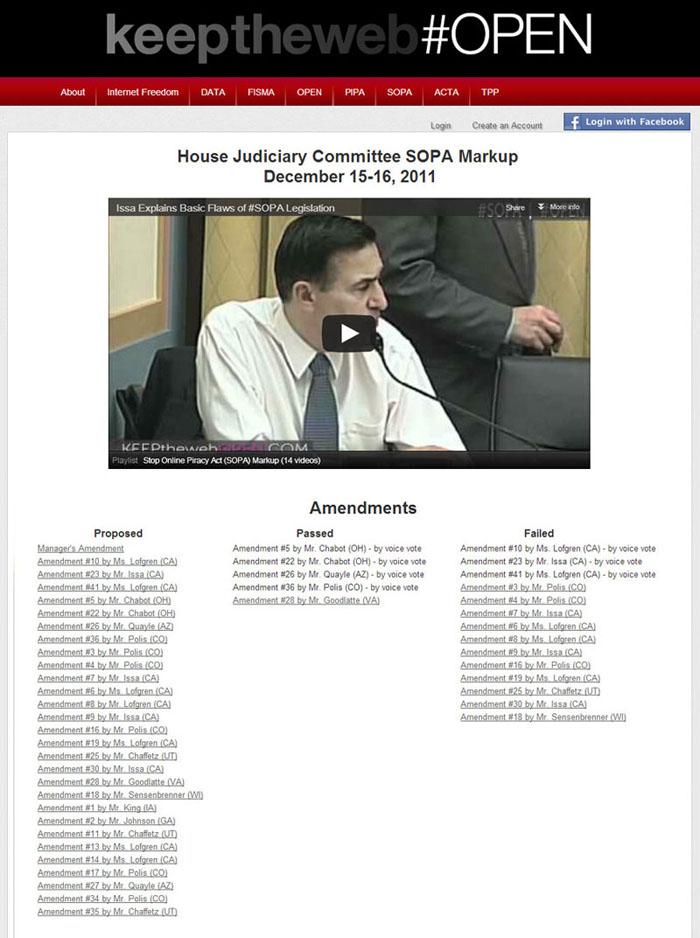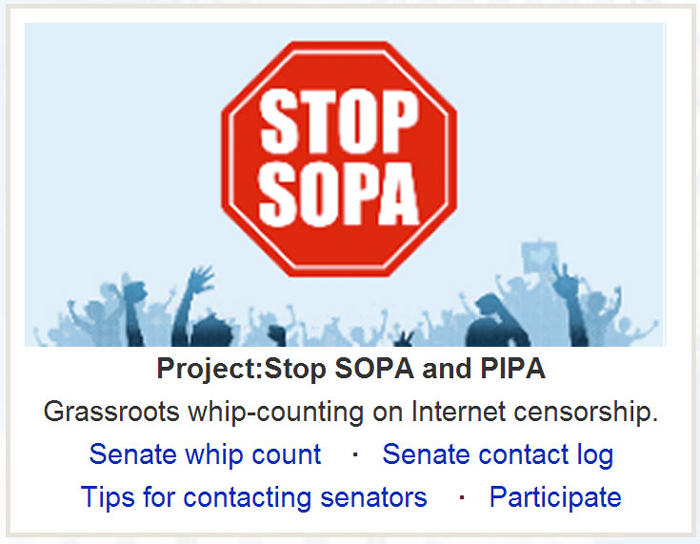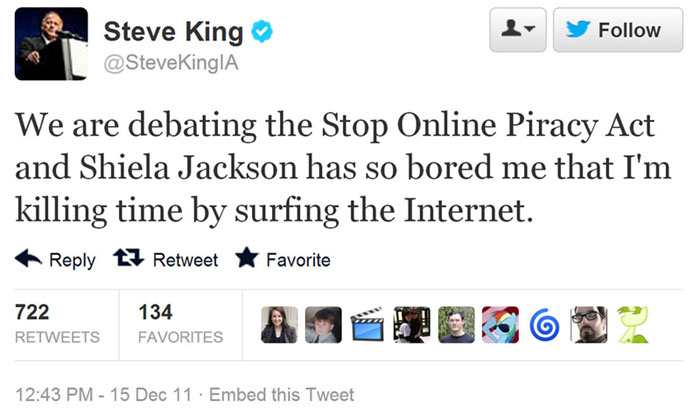Hacking Politics: How Geeks, Progressives, the Tea Party, Gamers, Anarchists, and Suits Teamed Up to Defeat SOPA and Save the Internet (28 page)
Authors: and David Moon Patrick Ruffini David Segal
Tags: #Bisac Code 1: POL035000

Chairman Smith had played the game perfectly prior to the markup. Speculation swirled about his planned Manager’s Amendment to tamp down the worst of the worst of the bill. And indeed, for those steeped in legislative maneuvering, the final product of Smith’s deliberations was a game-changer. The Manager’s Amendment narrowed the private right of action and included language designed to clarify that U.S. websites would be exempt from takedown. If there was a general consensus amongst the lobbyists and policy-types, it’s that Smith’s revisions brought SOPA in line with the PROTECT IP Act. And PIPA looked like a slam dunk in the Senate. This was particularly worrisome for the chances of stopping the legislation entirely.
Smith had also worked the phones among outside groups who had threatened to oppose SOPA and lobbied his members hard, successfully moving past critics off to the sidelines. Momentum for the anti-SOPA forces seemed to have stalled.
At a House staff briefing on December 13th, interest in the issue seemed relatively high judging from the level of attendance, but I couldn’t help but notice how unmoved the staff seemed, as though we were discussing a routine piece of legislative business. Upon reflection, until the Internet blew the doors open, to them it was. As my co-panelists took on the legal arguments, and Engine Advocacy’s Josh Mendelsohn made a powerful case for the destructive effect of the bills on startup innovation, I tried to ground the debate in some outside-the-Beltway realities: remember the eighty-four thousand phone calls on American Censorship Day? That was just the tip of the iceberg. Activists on both the right and left would fight mightily to protect their freedom of speech online, and they had the majority of Americans on their side.
Truth be told, I had no idea if the phone calls to Congress would materialize again or not. This depended in part on whether networks like Tumblr would
create the “inventory”—to use online advertising speak—to drive eyeballs and ultimately action to the cause. In this sense, the movement was still looking for the cavalry to ride to its rescue. For months, groups like ours, Demand Progress, CDT, EFF, and a smattering of others, were fighting a lonely battle against PIPA, and then SOPA. Nobody in Washington believed this coalition could beat Hollywood’s lobbying behemoth, so when tech companies were willing to encourage their users to take action, that elevated the fight to a new plane, beyond where the advocacy groups could go.

Rep. Darrell Issa, a Republican member of the House Judiciary Committee had been a vocal opponent of SOPA. During the December House Committee markup, Issa live-streamed the proceedings at
Keepthewebopen.com
and allowed visitors to easily see the numerous amendments to SOPA that lawmakers were entertaining.
The whole thing had the feel of a guerrilla operation. We knew, or assumed, we could not win in the committee, but had to live to fight another day. What could be done to force the other side to win ugly? To bring millions more people into the fight and ratchet up the pressure?
The opposition on the committee planned to offer as many amendments as possible. Democratic Rep. Jared Polis, an avid gamer and the only Internet entrepreneur in Congress, planned to force the committee to vote yea or nay on barring federal funds being used to benefit pornographers—who were some of the most aggressive copyright litigators. Rep. Zoe Lofgren, a Democrat from northern California, would ask movie theater owners to participate in SOPA’s rigid enforcement mechanisms; after all, movie theaters were themselves intermediaries for movie piracy, with “users” making bootleg recordings. Why not hold them accountable like you would the owners of a website with millions of users, some of whom traffic in pirated content?
In total, fifty-five amendments would be submitted. This was a delaying tactic. It would force the committee to stretch out its considerations for days, all the while giving time for the Internet to ratchet up the pressure on Congress.
In hindsight, this amendment strategy looks significant, but at the time, it was assumed to be little more than a rearguard action, a prelude for the real war for the full House.
December 14th, the day before the markup, was probably the low point for the anti-SOPA forces. Tech industry lobbyists spent the run-up to the markup fielding calls about defections from their ranks, and working feverishly to stave off more. This ranged from skeptics on the Judiciary Committee, to outside groups, to companies like Visa, a major backbone of Internet commerce, which endorsed the bill on the morning of the 15th, the day of the markup.
On the night of the 14th, I received a frenzied call from a tech industry lobbyist. Smith had been twisting arms, we didn’t know who was on our side anymore, and we were down to as few as half a dozen votes on the committee. The Internet needed to light up the phones. At the suggestion of a Capitol Hill veteran in my office, I would tweet out the direct line to the Judiciary committee staff room. It was reasoned that members would be taking meetings there in between votes. We brainstormed creative ways for members to experience the crescendo of outrage firsthand.
As the hearing was gaveled in on Thursday—a day late to allow for the Manager’s Amendment to be digested—it was before an audience of thousands online. Rep. Darrell Issa’s crafty and resourceful social media team had set up a website,
KeeptheWebOpen.com
, initially to showcase their government
transparency initiatives (including a platform called MADISON allowing wiki-style edits to legislation), that would be used as a platform to live-stream the hearings. While televised House proceedings were nothing new (think C-SPAN), committee live-streams were rare, and this would become one of the most watched markups (if not the most watched) in history, with one hundred fifty-seven thousand unique visitors on the first day of the markup.
The first sign that the opposition would not go down without a fight came with a relatively simple procedural motion: they forced a full reading of the bill before the committee—a process which would take more than an hour at the outset of the proceedings. This delay set the tone for the next two days and was set against the backdrop of an impending recess and Congress rushing to tie up loose ends before heading home for the holidays. The only bit of unfinished business that was keeping the full House in session was a fight with the White House over extending payroll tax cuts. To the extent SOPA couldn’t be voted out of Judiciary before a final floor vote on the payroll tax, the bill would be held up in committee heading into the election year.
Circling the wagons also had a side effect: demoralizing Smith’s troops on the committee. For months, the Judiciary rank and file had been told that the bill was noncontroversial and its passage was a slam dunk. Now, a vociferous and bipartisan opposition was forming against the type of bill—highly arcane and industry backed—that was supposed to be immune from rancorous debate and even public notice. Loyalty to Smith, and the sense that he would protect his committee members from having to attach their name to a politically suicidal bill, was cited by Judiciary Committee insiders as a key reason why SOPA had the support it did. Now, that foundation was starting to show cracks.
A core of opposition quickly formed around Issa (himself a senior Republican and chairman of the Government Oversight committee), Lofgren, Polis, and Republican Jason Chaffetz of Utah. This core group would eventually succeed in effectively filibustering the bill with repeated amendments, though the decisive success of their strategy wouldn’t be clear until the bill finally died after the January 18th blackout.
Chaffetz struck the first blow once the hearing was underway. Up until that point, not a single Internet engineer had been consulted—in the drafting stage or in the public hearings—on a bill that proposed to change how the core architecture of the Internet worked. (The initial hearing on SOPA was stacked 5-to-1 in favor of industry representatives in support of the bill.) The committee needed to slow down, listen to the experts, or in a Chaffetz turn of phrase that stuck, “Bring in the nerds.”
Members of the committee may not have been all that interested in arguments about Internet freedom, so Chaffetz worked another angle: cybersecurity. Monkeying with the DNS system to save Hollywood profits could undermine national security and cybersecurity by thwarting the implementation of the new DNSSEC standard. The protocol was designed to ensure that people always accessed the real website behind a domain name—no matter the site’s purpose.
Phishing attacks are rampant online, and impeding this critical security protocol could have increased their frequency and severity.
The proponents not only seemed unwilling to mount a technical defense of DNS blocking, but completely bored and uninterested in the subject. A few words spoken by North Carolina’s Mel Watt, the committee’s ranking Democrat, came to symbolize what was wrong with the entire process. In response to Chaffetz’s refocusing the debate around listening to the “nerds” who knew what the bill was about, Watt would insist that technical expertise wasn’t necessarily required, telling us “I am not a nerd. Hey, I may look like one, I may act like one sometimes, but you know, hey, I’m not trying to operate my congressional office without paper, you know.” Elsewhere in the hearing, Watt explained, “I am a pretty old-fashioned guy who still hasn’t figured out how, or even whether I want to use all the fancy technological advances that are out there.”
The words “I am not a nerd” spawned a tweet storm laced with derision and mockery, becoming a rallying cry for the Internet opposition as a whole. Technical expertise was essential to understanding SOPA, and the second highest ranking member of the Judiciary Committee and original sponsor of the legislation didn’t know much or care about the provisions in the bill that would break the Internet. His stumbling comments became fodder for YouTube—for Jon Stewart’s first foray into SOPA.
When it came time to vote on amendments, SOPA supporters still outnumbered supporters by a 2-to-1 margin. When Issa and Lofgren offered an amendment that would strike DNS blocking of overseas sites and filtering of search results, it went down on 12-22 vote—and this was one of the stronger performances by the opposition. The method of tabulating votes in the House Judiciary Committee also offered a telling insight in the tech-savviness of that body.

The hearing continued to drag along, but another moment of comic relief would prove to be a turning point. Reflecting the indifference of most members to the dry technical issues behind the bill, Republican Representative Steve King of Iowa began venting his frustration on Twitter:
We are debating the Stop Online Piracy Act and Shiela Jackson [sic] has so bored me that I’m killing time by surfing the Internet.

Jackson Lee spoke up to object, calling the remark “offensive.” Representative F. James Sensenbrenner (R-WI), a former committee chairman hostile to SOPA, piled on, demanding that Jackson Lee withdraw her remarks. Chairman Smith suggested she withdraw the word “offensive.”
After some back and forth involving the body’s Parliamentarian, and a long delay, Jackson Lee agreed to strike her one word rejoinder, and instead deem King’s tweet “impolitic and unkind.”
